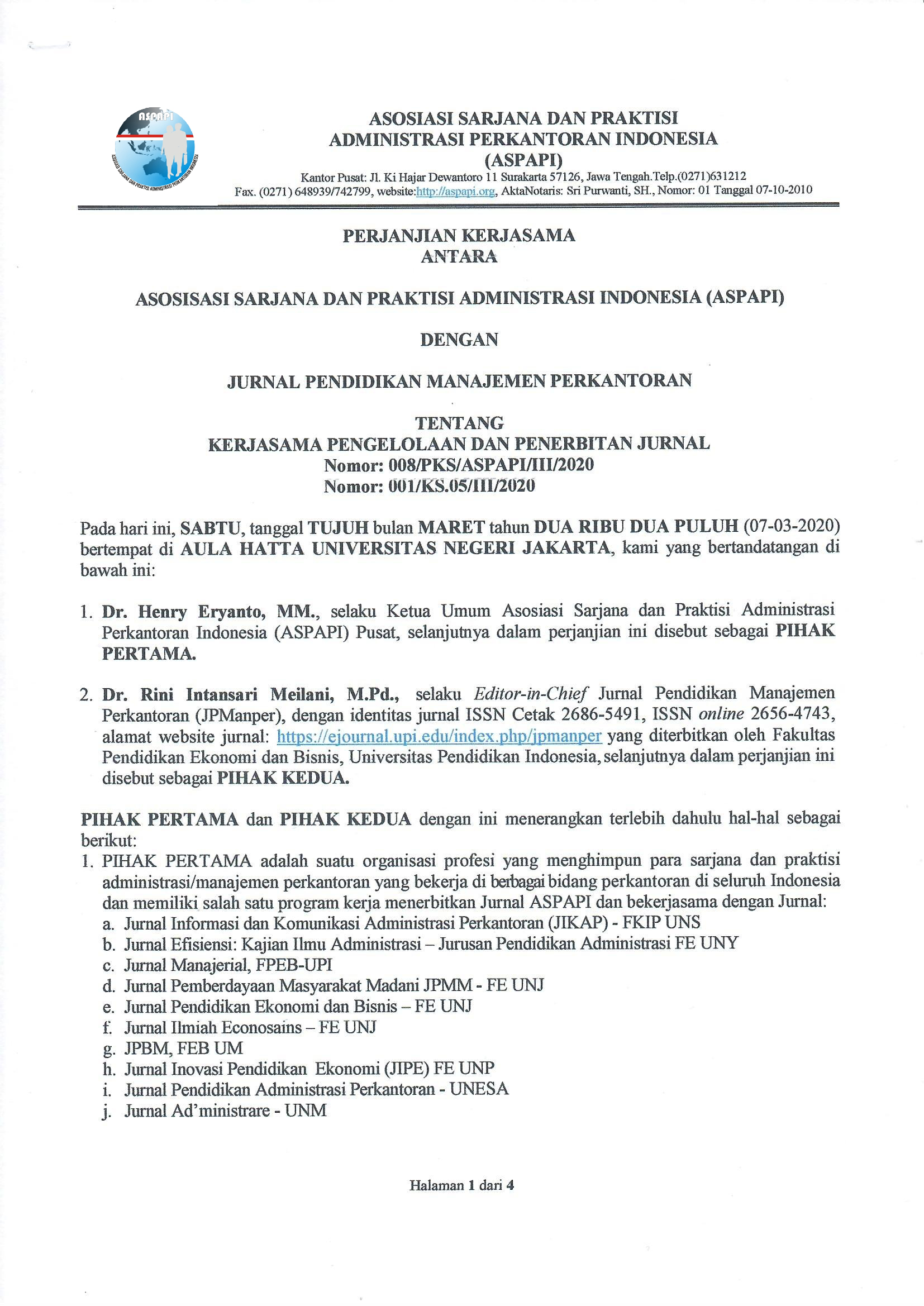Motivasi belajar sebagai determinan hasil belajar siswa
Abstract
This study aimed to determine the influence of learning motivation on student learning outcome. The research method used explanatory survey. Data collection technique used questionnaire rating scale models. Respondents are 106 students of vocational high school in Bandung. Data were analyzed using regression. The results of the study revealed that learning motivation a positive and significant influence on student learning outcome . Therefore, the student learning outcomes can be improved through improving the student learning motivation.
ABSTRAK
Penelitian ini bertujuan untuk menganalisis pengaruh motivasi belajar terhadap hasil belajar siswa. Metode penelitian menggunakan explanatory survey. Teknik pengumpulan data menggunakan angket model rating scale. Responden adalah 106 siswa di salah satu Sekolah Menengah Kejuruan swasta di Kota Bandung. Teknik analisis data menggunakan regresi. Hasil penelitian menunjukan bahwa motivasi belajar memiliki pengaruh yang positif dan signifikan terhadap hasil belajar siswa. Oleh karena itu, hasil belajar siswa dapat ditingkatkan melalui peningkatan motivasi belajar siswa.
Keywords
Full Text:
PDFReferences
Aziz, A. A., Yusof, K. M., & Yatim, J. M. (2012). Evaluation on the Effectiveness of Learning Outcomes from Students’ Perspectives. Procedia-Social and Behavioral Sciences, 56, 22-30.
Bakar, R. (2014). The effect of learning motivation on student’s productive competencies in vocational high school, West Sumatra. International Journal of Asian Social Science, 4(6), 722-732.
Brophy, J. (2013). Motivating students to learn. Routledge.
Dimyati, & Mudjiono. (2006). Belajar & Pembelajaran. Jakarta: Rineka Cipta.
Dimyati, M. (2006). Belajar dan Pembelajaran. Jakarta: Rineka Cipta.
Ekiz, S., & Kulmetov, Z. (2016). The Factors Affecting Learners’ Motivation in English Language Education. Journal of Foreign Language Education and Technology, 1(1).
Friskilia, O., & Winata, H. (2018). Regulasi Diri (Pengaturan Diri) Sebagai Determinan Hasil Belajar Siswa Sekolah Menengah Kejuruan. Jurnal Pendidikan Manajemen Perkantoran, 1(2), 37-44.
Jannah, R. (2017). Upaya Meningkatkan Keberhasilan Pembelajaran Pendidikan Agama Islam. Madrosatuna: Journal of Islamic Elementary School, 1(1), 47-58.
Kpolovie, P. J., Joe, A. I., & Okoto, T. (2014). Academic achievement prediction: Role of interest in learning and attitude towards school. International Journal of Humanities Social Sciences and Education (IJHSSE), 1(11), 73-100.
Makmum, A. S. (2003). Psikologi Pendidikan. Bandung: Rosda Karya.
Mølstad, C. E., & Karseth, B. (2016). National curricula in Norway and Finland: The role of learning outcomes. European Educational Research Journal, 15(3), 329-344.
Monika, M., & Adman, A. (2017). Peran Efikasi Diri dan Motivasi Belajar dalam Meningkatkan Hasil Belajar Siswa Sekolah Menengah Kejuruan. Jurnal Pendidikan Manajemen Perkantoran, 1(1), 110-117.
Németh, J., & Long, J. G. (2012). Assessing learning outcomes in US planning studio courses. Journal of Planning Education and Research, 32(4), 476-490.
Nurhasanah, S., & Sobandi, A. (2016). Minat Belajar Sebagai Determinan Hasil Belajar Siswa. Jurnal pendidikan manajemen perkantoran, 1(1), 135-142.
Palupi, R. (2014). Hubungan Antara Motivasi Belajar Dan Persepsi Siswa Terhadap Kinerja Guru Dalam Mengelola Kegiatan Belajar Dengan Hasil Belajar IPA Siswa Kelas VIII Di SMPN N 1 Pacitan. Jurnal Teknologi Pendidikan dan Pembelajaran, 2(2).
Popenici, S., & Millar, V. (2015). Writing Learning Outcomes. A practical guide for academics. University of Melbourne, Australia.
Puspitasari, D. B. (2013). Hubungan antara Persepsi terhadap Iklim Kelas dengan Motivasi Belajar Siswa SMP Negeri 1 Bancak. EMPATHY Jurnal Fakultas Psikologi, 1(1).
Riconscente, M. M. (2014). Effects of perceived teacher practices on Latino high school students’ interest, self-efficacy, and achievement in mathematics. The Journal of Experimental Education, 82(1), 51-73.
Sarifani, K. A. K., & Rasto, R. (2017). Keterampilan Manajerial Kepala Sekolah Dan Budaya Mutu Sebagai Determinan Kinerja. Jurnal Pendidikan Manajemen Perkantoran, 1(1), 30-40.
Singh, A. K., Srivastava, S., & Singh, D. (2015). Student engagement as the predictor of direct and indirect learning outcomes in the management education context. Metamorphosis, 14(2), 20-29.
Sudjana, N. (2009). Dasar-dasar Proses Pembelajaran. Bandung: Sinar Baru Algesindo.
Suwardi, D. R. (2012). Faktor-Faktor yang Mempengaruhi Hasil Belajar Siswa Kompetensi Dasar Ayat Jurnal Penyesuaian Mata Pelajaran Akuntansi Kelas XI IPS di SMA Negeri 1 Bae Kudus. Economic Education Analysis Journal, 1(2).
Taurina, Z. (2015). Students’ Motivation and Learning Outcomes: Significant Factors in Internal Study Quality Assurance System. International Journal for Cross-Disciplinary Subjects in Education, 5(4), 2625-2630.
Watson, P. (2002). The role and integration of learning outcomes into the educational process. Active Learning in Higher Education, 3(3), 205-219.
Widayanti, L. (2014). Peningkatan Aktivitas Belajar dan Hasil Belajar Siswa dengan Metode Problem Based Learning pada Siswa Kelas VIIA MTs Negeri Donomulyo Kulon Progo Tahun Pelajaran 2012/2013. Jurnal Fisika Indonesia, 17(49).
Winarni, M., Anjariah, S., & Romas, M. Z. (2016). Motivasi Belajar Ditinjau Dari Dukungan Sosial Orangtua Pada Siswa SMA. Jurnal Psikologi, 2(1).
Zamsir, L. M., & Fajrin, P. (2017). Pengaruh Motivasi Belajar Terhadap Hasil Belajar Matematika Siswa SMPN 1 Lawa. Jurnal Pendidikan Matematika, 6(2), 170-181.
DOI: https://doi.org/10.17509/jpm.v4i1.14958
Refbacks
- There are currently no refbacks.
Copyright (c) 2019 Jurnal Pendidikan Manajemen Perkantoran
Jurnal Pendidikan Manajemen Perkantoran View My Stats



